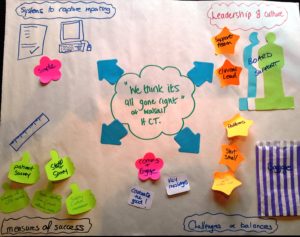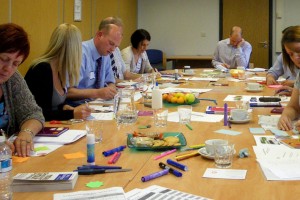- Home
- About us
- What we do
- Who we work with
- News
- Resources
- Shop
- Appreciating Health and Care
- Appreciating Health and Care: AI in practice eBook:
- Appreciating Health and Care interactive eBook:
- A Taste of AI
- Training Bundle 2
- AI Beginners Bundle
- Journaling Bundle
- More than Welcome cards
- Three Good Things journal
- Reflections Journal
- Number 1 Journal
- Awesome Journal 2
- Taste of AI cards 2.0
- Appreciating Church
- How to be More Awesome – a practical journey
- Creating Great Conversations cards
- Food for Thought – a journal for appreciating daily life
- AI essentials cards
- AI essentials eBook
- Appreciating Church Pack
- Get in touch
- hello@appreciatingpeople.co.uk
- 01309 671 584
Learning from Excellence and Quality Improvement in the NHS
Where did it all go right?! Supporting Learning from Excellence
Perspective, of course, depends where you’re standing. And that’s why reframing is important in our work – how we can help organisations see things from a new perspective, to help them learn something new, deal with change, or change the way they do things. It’s a key tool in Quality Improvement and Learning from Excellence.
So we’re talking about ‘good catches’ instead of ‘near misses’.
We all have a strong tendency to reflect on things that haven’t worked well, but Appreciative Inquiry helps us understand that we can learn much more from things that go well. It’s an idea that’s catching on in the mainstream, too. Increasingly, it’s an idea being used in sports psychology, where teams who review their good performance are shown to improve more than teams who review the things that didn’t go well.
When we learn from our good practice, morale and resilience is improved and our psyche is in a better position to learn. It’s called Learning from Excellence.
Since August 2016, AP has been working for the West Midlands Patient Safety Collaborative, which is part of the West Midlands Academic Health Science Network (WMAHSN). For three years now, dedicated staff in Birmingham Children’s Hospital have been using Appreciative Inquiry as the method for a programme called Learning from Excellence, and the WMAHSN has had such good reports of their work and such interest from its members that they have decided to support its rollout across the region.

Where did it all go right?!
As a result, they ran a series of introductory talks called Where did it all go right? and then asked interested people to sign up for a two-day AI training course run by Appreciating People. We’ve been asked to provide five of these two-day courses, and they’ve all been fully booked. The participants on them have been amazing – dedicated, talented and really interested in using Appreciative Inquiry to take another approach to learning and enhancing safety. You can see the illustrations for some of their ideas…
Traditionally, safety in healthcare has focused on avoiding harm by learning from error, but this approach may miss opportunities to learn from excellent practice. Excellence in healthcare is highly prevalent, but there is no formal system to capture it.
In Learning from Excellence [learningfromexcellence.com/], Adrian Plunkett says: We tend to regard excellence as something to gratefully accept, rather than something to study and understand. Our preoccupation with avoiding error and harm in healthcare has resulted in the rise of rules and rigidity, which in turn has cultivated a culture of fear and stifled innovation. It’s time to redress the balance. We believe that studying excellence in healthcare can create new opportunities for learning and improving resilience and staff morale.
The traditional approach is known as the ‘Safety-I’ approach – where safety is defined as a condition where the number of adverse outcomes was as low as possible.
But the Safety-I view doesn’t stop to consider why human performance practically always goes right. Things don’t go right because people behave as they are supposed to – but because people can and do adjust what they do to match the conditions of work. Despite the obvious importance of things going right, traditional safety management has paid little attention to this.
In a 2015 report looking at the future of safety management, Erik Hollnagel concluded that: ‘Safety management should move from ensuring that “as few things as possible go wrong” to ensuring that “as many things as possible go right”. We call this perspective Safety-II; it relates to the system’s ability to succeed under varying conditions.’
The participants we worked with at WMAHSN really responded to using AI to create positive education, and work on their Quality Improvement. It helped them build resilience, as they were focusing on the things they were good at, and celebrated their successes.
One of those participants told us: ‘The Appreciative Inquiry training will help me to run round table meetings exploring episodes of excellence better. But it will also be useful for my everyday practice, where I will use its strength-based methodology to help me get the best out of the theatre teams I work in.’
You can see more feedback that our participants shared on social media below.
+ve #lfeqi Worcester event 2day @simonb143 Move from Deficit "Look at what's missing" 2 Asset "Look at what we've got" Thx everyone @wmahsn pic.twitter.com/MvW0o7tgAK
— Brendan Young (@BrendanYoung3) November 28, 2016
Deep reflection & humour- learning from excellence #appreciativeinquiry & #LfEQI. Thanks to @ptsafetywm @adrianplunkett making it possible pic.twitter.com/06LL77gwDW
— Appreciating People (@AppreciatingP) January 19, 2017
Time to stop grazing on #LfE and #AI @Natasha47 @hayleybutler82 @Sw14Wilson let's gather the flock +stride to the summit of @AppreciatingP pic.twitter.com/pTVJHnCqFs
— Maggie Coleman (@maggi_ann) January 18, 2017
With @justinemjeffery for RCT to make a pledge for #nhschangeday to use LfE & A.I to support a positive safety culture @heartofengland pic.twitter.com/orHrieSdsg
— Natasha Stringer (@Natasha47) October 19, 2016
Exercising that #appreciativeinquiry muscle. Learn from the great that happens in the NHS everyday @PtSafetyWM @justinemjeffery @maggi_ann pic.twitter.com/u0py3AHw4B
— Natasha Stringer (@Natasha47) October 19, 2016
The power of a positive approach…. #appreciativeinquiry #LfEQI pic.twitter.com/KjFIfouIwv
— West Midlands PSC (@PtSafetyWM) October 18, 2016
Wonderful creative learning from #Excellence day w #appreciativeinquiry @PtSafetyWM @adrianplunkett @simonb143 @NWAmb_QI @PeteWMAHSN pic.twitter.com/UMc1PsCBrw
— Appreciating People (@AppreciatingP) October 18, 2016
Appreciative Inquiry: a refreshingly positive approach to improvement. Looking forward to putting it into practice. @AppreciatingP @wmahsn
— Emma Plunkett (@emmaplunkett) October 18, 2016
Stop Press – Birmingham Children’s Hospital proud to be rated ‘Outstanding’ by Care Quality Commission.
Several of our clients in schools and in churches are also interested in seeing how they can implement the concepts of studying excellence. For more information, click here to email us, or give us a call on 0151 427 1146.





